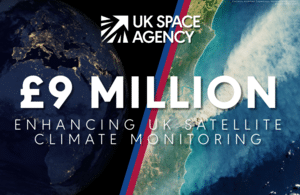
The UK Space Agency has announced a significant £9 million investment to develop a new generation of satellite instruments for monitoring Earth’s atmosphere. This funding, delivered through the Centre for Earth Observation Instrumentation (CEOI), will support 12 innovative projects focused on measuring critical emissions like carbon dioxide, methane, and nitrogen dioxide.
This investment marks a doubling of the CEOI program’s previous largest funding round, showcasing the UK’s commitment to tackling climate change. The advanced instruments developed through this initiative hold the potential to revolutionize our understanding of global emissions.
Andrew Griffith MP, Minister for Space at the Department for Science, Innovation and Technology, said: “This exciting new generation of satellite instruments, backed by £9 million in government funding, will play a key part in our efforts to tackle climate change, pinpointing where emissions are highest on our planet and cementing UK leadership in Earth observation, while helping to attract more private investment into this fast-growing sector.”
These instruments offer a clearer picture of activities and incidents causing high emission levels. This data will be crucial for pinpointing sources like wildfires or inefficient farming practices, enabling targeted interventions to reduce their environmental impact.
Beth Greenaway, Head of Earth Observation and Climate at the UK Space Agency, said: “Satellites play a vital role in monitoring emissions, weather patterns and other environmental factors, using a variety of sensors and instruments that return information to Earth. Indeed, some of the information can only be collected from space.
“These new projects highlight the strength and diversity of UK expertise in both universities and companies across the UK – they are at the cutting edge of inventing the newest tools and techniques. The 16th CEOI call shows that we are ready to match the commitment of the UK space sector to ensuring the Earth observation capabilities stay at the forefront of the global demand.”
“Satellites are critical for monitoring emissions, weather patterns, and other environmental factors. They provide data that would be impossible to collect from the ground, offering an invaluable perspective on our planet’s health.”
UK Strength in Earth Observation
These new projects highlight the UK’s leading position in Earth observation technology. The expertise of both universities and companies across the country is central to developing cutting-edge tools and techniques for environmental monitoring.
The UK’s commitment to Earth observation extends beyond this investment. The country has pledged a substantial £314 million to Earth observation programs as part of a record-breaking £1.8 billion investment in the European Space Agency (ESA).
Several UK projects funded through previous CEOI rounds have been shortlisted for the latest ESA Earth Explorers program. These innovative missions, Hydroterra+ and Keystone, focus on acquiring crucial data on water cycles and atmospheric oxygen variations, respectively. Their success underscores the UK’s expertise in this critical field.
The Earth Explorers program includes missions like EarthCARE, a collaborative effort between Europe and Japan scheduled for launch later this month. This mission aims to improve the accuracy of climate predictions and weather forecasts. The UK has made significant contributions to EarthCARE, with participation from leading British companies and universities.
Other upcoming missions, such as Biomass, highlight the UK’s dedication to environmental monitoring. Built by Airbus in the UK, Biomass will provide vital information about the state of forests globally.
Boosting Innovation
The £9 million CEOI investment will be further bolstered by over £2 million in additional funding from academia and the private sector. This combined effort demonstrates a strong commitment to developing cutting-edge remote sensing technologies.
Nicolas Leveque, Director of the CEOI, said: “This additional funding from the UK Space Agency demonstrates its continued support for the development of high-end remote-sensing technologies. These technologies will fill many gaps in our observing capabilities and help better understand some of the more complex processes driving the Earth climate and environment. This funding round will act as an accelerator, bringing the launch of new instruments forward by several years.
“We also welcome the responsiveness of the research, academic and industrial community, who have put together ambitious work plans to match the level of investment.”
The UK’s investment in satellite technology signifies a significant step forward in the fight against climate change. These pioneering instruments offer a powerful tool for monitoring emissions, informing policy decisions, and ultimately, protecting our planet for future generations.
Swanwick House, 22 Towcester Road, Old Stratford, Milton Keynes, MK19 6AQ, UK
© 2025 Project Management Global. All rights reserved | Privacy Policy